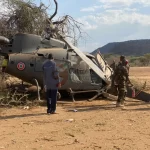In a heart-wrenching and catastrophic turn of events, Toi market, a bustling hub of commerce and livelihood, transformed into a harrowing scene of chaos and despair on a fateful Sunday morning. The market, located in Nairobi, became engulfed in a massive fire that ravaged its premises, leaving countless traders grappling with profound losses and the daunting task of rebuilding their shattered businesses. The inferno, believed to have originated from an electrical blow-up in one of the stalls around 1 am, swiftly escalated into an uncontrollable blaze, engulfing neighboring structures in its destructive path.
Eyewitnesses on the scene recount the distressing sequence of events, as the market’s security team identified an electrical failure as the triggering cause of the fire’s ignition. “The fire started around 1 am, and the security team has informed us that it was caused by an electrical failure,” revealed one trader, their voice heavy with anguish, in a statement provided to the press. Another trader, who arrived at the market to confront the devastating aftermath, estimated that an astonishing 3,000 stalls, each representing a unique story of entrepreneurship and determination, had been mercilessly reduced to nothing but charred remnants. Expressing the magnitude of their loss, the trader shared a painful account: “I received a distressing call around 1 am, but due to the late hour, I was unable to reach the market in time. Sadly, upon my arrival, I discovered that my stall, once brimming with pillows, pillowcases, duvets, and various other items, had been entirely consumed by the relentless flames. This tragedy has affected not only me but approximately 3,000 stalls and the dreams and aspirations of countless fellow traders.”
In response to the alarming situation, the Nairobi County fire brigade promptly mobilized its skilled team, ready to battle the ferocious blaze and mitigate further devastation. However, their valiant efforts were hindered by significant obstacles posed by the limited accessibility within the market’s vicinity. Narrow roads and cramped pathways, intricately woven amidst the labyrinth of stalls, impeded the firefighters’ progress, exacerbating the challenges they faced. Frustrated and anguished traders, desperate to salvage whatever remnants of their livelihoods remained, voiced their grievances as they watched the fire brigade struggle to penetrate the affected areas. “They arrived and stopped on the road… there is no pathway to enter the market, and in most places, gates have been erected,” shared one trader, whose presence at the scene bore witness to the mounting frustrations of the affected community.
Amidst the chaos and mounting concerns, some residents alleged a disconcerting revelation. Despite the prompt arrival of firefighting trucks, these vehicles were reportedly inadequately equipped with water, casting doubt on the effectiveness of the operation. “How can they bring trucks without water? I witnessed it myself. Three trucks arrived, but to our astonishment, they informed us that they needed to source water from Nairobi Water,” a trader asserted, raising questions about the adequacy of the firefighting resources deployed in such critical emergencies.
In the wake of this devastating calamity, the traders of Toi market, bound together by their shared hardships, resolutely call upon the government and relevant authorities to prioritize and implement comprehensive safety measures. The urgency for enhanced safety infrastructure, such as wider access roads and improved water supply for firefighting purposes, cannot be overstated. Through proactive initiatives and investment in robust safety regulations, the government can effectively safeguard the livelihoods of traders and communities, creating a more resilient and secure marketplace environment that can withstand future crises.
The tragic Toi market inferno serves as an alarming reminder of the vulnerable conditions under which many traders operate and the critical role that stringent safety protocols play in protecting their businesses and livelihoods. As investigations into the fire




